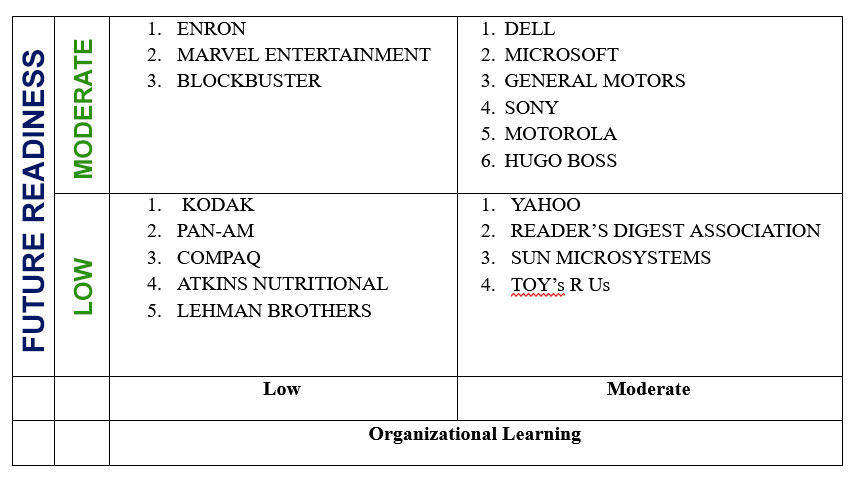The Champions’ Curse: Losing foresight

Champions’ are cursed!! Opine others when a champion falter? What went wrong? Was it lackadaisical in future readiness or an organizational learning or both or did they lack the strategic foresight altogether? What unique management lessons can be culled out from these ‘champions’ curse’ for CEO’s?
Kodak: This ground-breaking photography-based enterprise existed since the late 1800s, was plagued with advent of digital photography era, vectored by serious innovation challenges. This most visible enterprise was rendered to obscurity even with the best of the lenses. Kodak failed to visualise.
Pan-Am: It was a dominant international air carrier, known for service innovation. It succumbed due to corporate mismanagement, government indifference and flawed regulatory policy. Pan- am flew away outside the visible range never to return as its radar could not scan the horizons for detecting the brewing turbulence in the aviation sector. It simply entered the limbo of the lost.
Compaq: Traversing onto reverse engineering IBM personal computer, it spearheaded the business succumbing later to price wars. Dell was acquired by HP and subsequently the brand-named ‘Compaq’ was retired. Compaq probably faltered viewing one-time innovation as the power pack that would last forever.
Atkins Nutritionals: The company encashed the low carb diet opportunity. However, with time people lost interest in the eating style and the enterprise filed for bankruptcy. Fads fade fast and people prefer turning a blind eye to its existence ever.
Lehman Brothers: US’s fourth biggest investment bank got engaged to ace accounting tricks to appear relatively stable than it was, eventually being exposed by the mortgage crisis, leading to bankruptcy. In the business of bookkeeping, laymen could be tricked through fudged figures but professional forensic accounting experts possess ‘see-through’ goggles.
Yahoo: Yahoo tried to capitalise on its pioneering existence by levying charges for e-mail, which Google offered for free. Customers flocked to Google. Yahoo exists today partnering with players it once disregarded to remain profitable, however folded up many of its forays due to competition. The cry of elation ‘Yahoo’ was destined to be heard only so far as the voice would carry, looking for means to amplify could have helped.
Reader’s digest Association: The old-fashioned publication succumbed too. Not keeping sight of the rapidly changing customer demographics to realign the publication led to the book being judged by its cover rather than the content.
Sun Microsystem: Sun remained an industry giant known for programming in Java. The dot-com bust wiped out its customer base and changed the way companies met their technology needs. As PCs became more powerful, few remained with Sun’s expensive servers with Oracle buying out Sun Microsystems. The ‘Oracle’ could see when the navigators were blinded by the sun.
Toys “R” Us: They thrived between ’80s-’90s, with a concept for speciality but seized with the advent of game-changers from discounters like Wal-Mart and Amazon. They scribbled their turnaround with private investors entry, through closures, layoffs and downsizing to repay the debt. Toying too long with strategic decision-making leads to a myopic outlook.
Enron: Once considered a leading business in electricity and natural gas, tumbled due to systemic accounting failures, leading to bankruptcy with a critical query on corporate accounting practices. Creating a smokescreen to obscure vision is a war strategy, which can get pierced with a 20|20 vision of the onlooker. Enron probably was entrapped.
Marvel entertainment: The comic book company for decades depicted few favourite characters like Spider-Man, Captain America etc., with a hunt to have its ‘own hero’. It succumbed in 1996 with an ‘entertaining’ drama. Sadly, the marvellous stories of eye-catching comic characters had become more a cinematic treat rather than a read anymore.
Blockbuster: They stole the show from its contemporaries including the rental stores in vicinity. Then new age players pierced, making it harder for the company to hold onto their dominance in the home entertainment industry, thereby causing its bankruptcy. The pulse of the audience shifted and they chose not to watch ‘Blockbusters’.
Dell: Dell propelled a direct selling to consumers, riding on advent of the Internet. The mobile devices began displacing PCs with cheaper machines. The changing customer orientation was towards end-to-end service rather than just hardware. Eureka moments are few and far between, keeping the user captivated requires staying illuminated for enhanced visibility.
General Motors: A global leader in automobile industry for almost 77 years with mounting debt coupled with a poor economy pushed them toward bankruptcy. However, it managed to negotiate this blind kerb with an initial public offering, garnering a phenomenal response. Driving out of a tight spot needs acute vision judgment along with an excellent driver’s skill.
Microsoft: Democratising the PC through mass-market appeal, it passed several ideas that others capitalized. Microsoft remained glued to one business line making it a risky affair in a rapidly evolving industry. Apparently, the market started shifting away from the PCs that Microsoft’s software is designed for! Not seeing the road signs may take one down a one-way road with a long turnaround.
Sony: Possessing a Sony Walkman was as ubiquitous and synonymous to today’s iPod, it dominated the market but lost leadership in several core product lines. Sony misgauged the trending shift of the consumer emphasising on the brains of the device (software) rather than the circuitry (hardware). Agile competitors like LG, Samsung, Apple and various smartphone players have outpaced this old-school innovator. Looking at the wrong place to innovate will seldom lead to serendipity.
Motorola: The industry leader on radios failed to focus on smartphones as they emerged. It rapidly lost market share to newcomers like Apple, LG, and Samsung. Motorola subsequently retained its focus on networking equipment. You remain a ‘Talkabout’ in the long run once consigned to a backmarker position in the race.
Hugo Boss: The fashion wear from Germany picked up again post-bankruptcy having presence in over 100 countries. The rapidity of change in the environment probably did-in Hugo Boss. But proverbial to the name he bounced back with foresight to traverse the delicate and turbulent times of the world war era to remain a visible and impactful player nearing a centennial of existence. Do you wear Hugo Boss glasses by the way?
Future readiness vs Organizational learning
Lessons
The fallen Champions probably never realized that their lack of foresight was propelling them towards a strategic blindness. The accelerating change (volatility) coupled with uncertainty and complexity of causal effects created ambiguity, enveloping these champions by all elements of VUCA. The lack of foresight to traverse this turbulent path rendered these once Champions to the side-lines, as new players overtook them for podium finishes.
Written by Dr. Manoj Joshi. Have you read?
Best Hospitality And Hotel Management Schools In The World For 2021.
Best Fashion Schools In The World For 2021.
Best Business Schools In The World For 2021.
Best Medical Schools In The World For 2021.
Follow CEOWORLD magazine on Facebook, Twitter, Instagram, and LinkedIn.
Bring the best of the CEOWORLD magazine's global journalism to audiences in the United States and around the world. - Add CEOWORLD magazine to your Google News feed.
Follow CEOWORLD magazine headlines on: Google News, LinkedIn, Twitter, and Facebook.
Copyright 2025 The CEOWORLD magazine. All rights reserved. This material (and any extract from it) must not be copied, redistributed or placed on any website, without CEOWORLD magazine' prior written consent. For media queries, please contact: info@ceoworld.biz









